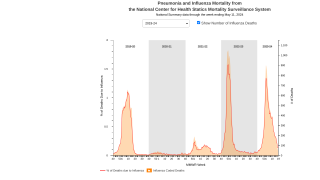Flu Shots Don't Reduce Coronavirus Risk

While influenza vaccinations reduced the risk of catching the seasonal flu in Canada by about 40%, they were found not to have an impact on coronaviruses or other non-influenza respiratory viruses (NIRV).
According to a study published on May 22, 2020, ‘these researchers noted that influenza vaccination had no significant effect on any NIRV studied, either separately or in combination.’
In this 7-season analysis by the Canadian SPSN, the finding provides reassurance against the speculation that influenza vaccine may negatively affect COVID-19 disease risk.
This new disease is caused by the novel SARS-CoV-2 coronavirus.
Human coronaviruses are everywhere and were identified decades ago. The first human coronavirus was isolated in 1937.
Since its discovery, related coronaviruses have been found to infect cattle, pigs, horses, turkeys, cats, dogs, rats, and mice.
They are the 2nd leading cause of the common cold, after rhinoviruses, and until recent decades, they rarely caused any disease more serious than the common cold in humans.
People around the world commonly get infected with human coronaviruses 229E, NL63, OC43, and HKU1 say the US Centers for Disease Control and Prevention (CDC).
According to this study, NIRV included enteroviruses/rhinoviruses (645; 25%), coronavirus (570; 22%), respiratory syncytial virus (524; 20%), human metapneumovirus (390; 15%), parainfluenza (316; 12%), adenovirus (114; 4%) and bocavirus (6; <1%).
‘Addressing such speculation is important to maintain influenza vaccine coverage through the ongoing COVID-19 pandemic,’ said these researchers.
The researchers observed no significant difference in vaccine effectiveness on coronavirus risk based on age.
In conclusion, ‘our findings provide reassurance that protective influenza vaccination does not negatively affect NIRV risk, including coronaviruses.’
The CDC recommends influenza vaccinations for everyone over age 6 months, with any licensed, influenza vaccine that is appropriate for the recipient’s age and health status.
Typically, about 40 percent of residents in the USA get vaccinated each flu season.
However, new research indicates the 2020-2021 flu season in the Northern Hemisphere may be an exception.
A recent Reuters/Ipsos poll conducted during May 2020 found that about 60 percent of U.S. adults plan to get the flu shot this year.
Additionally, a separate survey commissioned by CVS Health between January and May found consumers who said they will definitely or are likely to get a flu shot rose from 34 percent to 65 percent.
In general, current flu vaccines tend to work better against influenza B and influenza A(H1N1) viruses and offer lower protection against influenza A(H3N2) viruses, says the CDC.
Flu vaccine news published by Precision Vaccinations.
Our Trust Standards: Medical Advisory Committee

























